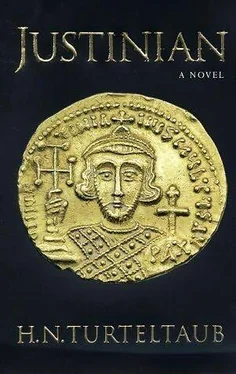Harry Turtledove - Justinian
Здесь есть возможность читать онлайн «Harry Turtledove - Justinian» весь текст электронной книги совершенно бесплатно (целиком полную версию без сокращений). В некоторых случаях можно слушать аудио, скачать через торрент в формате fb2 и присутствует краткое содержание. Жанр: Историческая проза, на английском языке. Описание произведения, (предисловие) а так же отзывы посетителей доступны на портале библиотеки ЛибКат.
- Название:Justinian
- Автор:
- Жанр:
- Год:неизвестен
- ISBN:нет данных
- Рейтинг книги:3 / 5. Голосов: 1
-
Избранное:Добавить в избранное
- Отзывы:
-
Ваша оценка:
- 60
- 1
- 2
- 3
- 4
- 5
Justinian: краткое содержание, описание и аннотация
Предлагаем к чтению аннотацию, описание, краткое содержание или предисловие (зависит от того, что написал сам автор книги «Justinian»). Если вы не нашли необходимую информацию о книге — напишите в комментариях, мы постараемся отыскать её.
Justinian — читать онлайн бесплатно полную книгу (весь текст) целиком
Ниже представлен текст книги, разбитый по страницам. Система сохранения места последней прочитанной страницы, позволяет с удобством читать онлайн бесплатно книгу «Justinian», без необходимости каждый раз заново искать на чём Вы остановились. Поставьте закладку, и сможете в любой момент перейти на страницу, на которой закончили чтение.
Интервал:
Закладка:
You're right, Brother. So far as I know, nobody in the Roman Empire ever did anything like that before Justinian.. except for having people tonsured and shutting them away in monasteries, that is. What? It's not the same? I suppose not, especially if they let you keep your eyes before they shut you away.
Bitter? Why on earth would I be bitter? I thank God every day that I'm alive. Well, almost every day. Some days, certainly.
JUSTINIAN
But for a few small raids by the Bulgars, the empire remained at peace over the next couple of years. And those raids were met promptly and well by the Mardaites whom I had resettled along the frontier with the Bulgars. My advisers had claimed I would tear down the brazen wall between the Roman Empire and the followers of the false prophet the Mardaites represented, but they were mistaken. The Mardaites did, however, build up a soldierly wall between the Empire and the Bulgars, a wall sorely lacking up to that time.
Abimelekh, the Arabs' miscalled commander of the faithful, continued sending me the annual tribute the treaty to which I had made him agree required of him. Each year, though, more and more of the goldpieces contained within that tribute were neither proper Roman nomismata nor close Arab imitations of our coins, but rather their newfangled mintings with inscriptions in their own tongue. Furthermore, the papyrus the deniers of Christ sold to our chancery was now marked not with the holy and life-giving cross, as had always been the custom, but with passages from the lying works of their false prophet.
Remembering my earlier conversation with Stephen the Persian, I summoned the engraver Cyril, saying to him, "I want you to ready for me new designs for our nomismata, these having inscriptions mocking Mouamet. Choose whatever texts you like, so long as they are properly insulting. If you have trouble coming up with ideas, talk with a priest or even with the ecumenical patriarch."
Cyril being a fine and pious Christian, I had expected him to leap gladly on the orders I gave him. Instead, he looked troubled, saying, "Emperor, must I change the coins that way?"
He did not speak disrespectfully, as the arrogant manikins who called themselves carpenters had done. The respect he showed helped me keep my temper. Instead of growing angry, as I might otherwise easily have done, I replied, "Good heavens, why on earth would you not want to do this?"
His earnest face twisted. "I don't know if I can make you understand, Emperor." He thought for a little while, then said, "Let me put it like this: a nomisma isn't something just for the moment. It's something that lasts a long time. You look through a pile of goldpieces, you'll see coins struck in the reign of Herakleios, of the first Justinian, of Anastasios, of Theodosios, even of Constantine. Those are scarce, God knows, but they show up now and again. Five hundred years from now, people will find your nomismata the same way. Seems a shame to put slogans on 'em for the quarrels of a moment, if you know what I mean."
Greek as it is customarily written, having many memories of ancient days in it, does not well reflect Greek as it is spoken by men of little education, as Cyril certainly was. In trying to call back to memory his words, I am certain I have made him more eloquent than he was. Yet sincerity blazed from him.
And, when backed by such sincerity, his words, commonplace though they may have been, had their effect on me. For the point he was making was an important one. Unlike some barbarian kingdoms, the Roman Empire spans the centuries no less than it bestrides the civilized world, extending even in these sorry days from the southern Pillar of Hercules where the Mediterranean meets the great outer Ocean to the Caucasus Mountains. Seen from that longer viewpoint, concerns of the moment all at once seemed less pressing.
I said, "Very well, perhaps mocking the Arabs' false prophet with slogans is not the best way to show we disapprove of what they are doing with their coins. But I do not intend to let them think they can get away with their outrages, either."
"Oh, no, Emperor!" the engraver exclaimed. "I don't want that, either. Let me see if I can find a better way to do it, so that anybody who looks at your nomismata even a thousand years from now will see how splendid they are."
"A thousand years from now," I murmured. I wondered who would be Emperor of the Romans then, and what his nomismata would look like. Surely they would be pure. From the days of Constantine the Great to my own, a span of more than three and a half centuries, the Roman Empire has struck coins of pure gold, seventy-two to the pound. I saw- and to this day see- no reason for that not to continue forever.
"I'll come up with something good, Emperor," Cyril promised. "I'll think and I'll sketch and I'll pray till I do. God will put something in my mind so I can give Him the glory He deserves."
"Let it be as you say," I said, dismissing him. And it was as he said, although two years passed before God graced him with the vision he immortalized in gold. The wait, though longer than I would have liked, was, I must say, worth it.
MYAKES
Somewhere right around the time he was writing those words, Brother Elpidios, the Arabs took the southern Pillar of Hercules away from us, and ran up into western Iberia, the land I've also heard called Spain. And nobody- nobody Roman, anyhow- knows how far to the east they've spread word of the false prophet. These are hard times for us Christians; if Constantinople had fallen in that last siege, there might not be any Christians left in the whole world today.
What's that, Brother? On account of our sins, you say? Maybe, but aren't the Arabs sinners and followers of a false religion? Why do they flourish, when all we do is suffer? Eh, Brother Elpidios? Why is that?
That same summer, churchmen began arriving for the synod that would make good the lack of regulations issuing from the fifth and sixth ecumenical synods. Indeed, because it was intended to be a supplement to those synods, the ecumenical patriarch styled it in his letter of announcement the fifth-sixth synod, penthekte in Greek, and, I learned from western arrivals who had had the letter translated into the Latin more commonly used there, quinisextum in that tongue.
The synod itself was not to begin for another year. At first, I was surprised to learn of so many bishops coming so soon. But a moment's reflection sufficed to explain that. What man of sense, offered the choice between spending time in whatever dreary town he called home and in the Queen of Cities, could fail to desire the latter?
In that same otherwise quiet summer came a letter from the brother of Theodore of Koloneia, who served as bishop of the city from which Theodore had sprung. In it, he complained of the iniquities of the Paulicians, a heretical sect originating among the Armenians, by whose country Koloneia lies. Their crimes included not only misbelief by also idolatry.
Not wanting my name for the orthodoxy tarnished at a time when bishops from throughout the known world were gathering in the imperial city, I ordered the bishop to suppress these heretics (against whom, in an earlier outbreak, my father had also moved) by whatever means proved necessary, up to and including summoning troops from the Armeniac military district to break up their robbers' nests. Any who refused to recant their error or who returned to it after such recantation were to be burned alive.
After their leader, who, to help him escape detection, went by two names, Sergios and Titus, met death in this fashion, these Paulician heretics ceased to trouble the borders of the Roman Empire. To this day, I remain proud of having succeeded in putting them down once for all and in restoring the area to perfect allegiance to the orthodox faith.
Читать дальшеИнтервал:
Закладка:
Похожие книги на «Justinian»
Представляем Вашему вниманию похожие книги на «Justinian» списком для выбора. Мы отобрали схожую по названию и смыслу литературу в надежде предоставить читателям больше вариантов отыскать новые, интересные, ещё непрочитанные произведения.
Обсуждение, отзывы о книге «Justinian» и просто собственные мнения читателей. Оставьте ваши комментарии, напишите, что Вы думаете о произведении, его смысле или главных героях. Укажите что конкретно понравилось, а что нет, и почему Вы так считаете.












